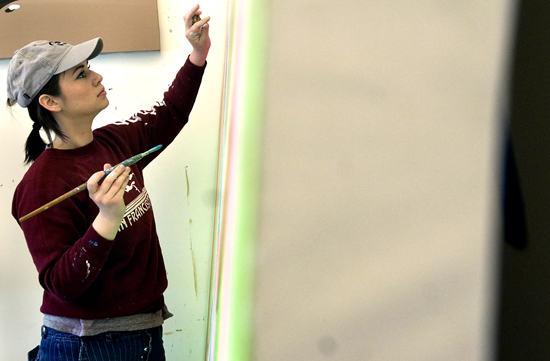The way Samuel Jones sees it, he never had a choice but to pursue his dream of becoming a hip-hop artist; he’s been rapping since he was 12 years old, scribbling verses in a spiral notebook in the suburbs of Philadelphia.
“I write ““ every day, nonstop.” said Jones, an alumnus whose stage name is Sammy G. “It’s what I do.”
One day during his first year at UCLA, he jumped up on the stage after a Blue Scholars and One Be Lo concert and spit 16 lines during a rap battle. He’s never looked back.
“I don’t want to do anything else,” Jones said. “I can’t get some menial job and be satisfied with the trajectory of my life.”
Jones and many other aspiring artists, painters, musicians and designers at UCLA are confidently taking the first steps toward nontraditional and uncertain careers, unfazed by increasingly competitive job markets. The decision to stray off the beaten paths takes courage, hard work, and in Jones’ case, an abundance of ardor.
“The only way I can’t make a living at it is if I quit. If I put effort forth, and I come at it with everything I got, I can’t fail,” he said.
Jones’ optimism is admirable, especially when high-powered pre-professional students such as Annie Geffroy, a fourth-year communication studies student, are starting to use the word “hopefully” a lot to describe their job search.
“I look at career websites every day, which is sometimes fun, but often depressing because there’s so little out there,” Geffroy said.
Geffroy’s resume is impressive. Aspiring to work in the entertainment industry, she spends several hours a week following up on opportunities and writing cover letters. She’s networked extensively within her industry, completed five internships and taken multiple leadership positions on campus, such as serving as the president of her sorority, Kappa Delta, last year.
But Geffroy said she expects to be searching for a job for at least the next six months.
“I’m anxious about it,” Geffroy said. “I’ve had friends who’ve graduated and have already gotten laid off after a year.”
For many aspiring artists, reality has asserted itself. Part-time jobs are rare and pay less, and performing and showcasing opportunities are more fiercely contested than they have been before. It’s not only difficult to sell art, but also to create it. Studio spaces and sound studio time is increasingly expensive.
Jones has struggled to find opportunities. He recently obtained representation from Los Angeles-based firm LionStarr Management, but the hookup hasn’t yielded any opportunities. Jones said he was going to take a job selling office supplies but turned it down because it only paid commission.
“It was kind of a smack of reality,” Jones said, who had to return home to Philadelphia.
Lauren Silva, a painter and a recent graduate of UCLA’s fine arts program, is in a similar position.
Her painting career is off to a healthy start by all standards. Her work has been exhibited in various on-campus exhibitions, including a piece that’s displayed in Untitled, the Broad Art Center cafe. She was also awarded a scholarship for her art and was granted one of the highly contested on-campus studio spaces for graduating seniors last year.
Silva seems to have done everything right. She has the support of the faculty, the school and an impressive portfolio, but she said the field is simply not lucrative enough to consider as a full-time career.
“One thing that I kind of come to terms with is that I’m not going to be able to make a living off of my work. … So there will be a day job,” Silva said.
Many artists have found themselves making concessions to financial reality ““ cutting corners off of their dreams and hitching their talents to anything that will pay the bills.
Adam Shumate, a jazz pianist and a recent graduate from UCLA’s music program, moved back to his hometown of Boston to save money and attend music school. He said he’s had trouble finding steady work, though he’s worked harder than ever before.
“I’m down to play whatever,” Shumate said, “but it’s been mostly little odd jobs.”
Shumate, who has played at some of L.A.’s greatest jazz venues with UCLA’s Macha Quartet, now works as a private music tutor, teaches a class at a private school and plays for a theater company. He comes home exhausted but still finds time to write and record music.
He said that talent doesn’t guarantee success any more.
“It’s not 1950 anymore. You can’t just be a badass player. … You have to be exceptional to make a living at it,” he said. “It’s really a very intense grind.”
Jones said he knows he’s at the beginning of a lonely, arduous path. But even though he’s broke and living on his friends’ couches, he’s not about to quit. His EP, which he hopes to release this summer, will be titled “No Direction.”
“I love making music,” Jones said. “And if I treat it like a 9 to 5, money will come.”
